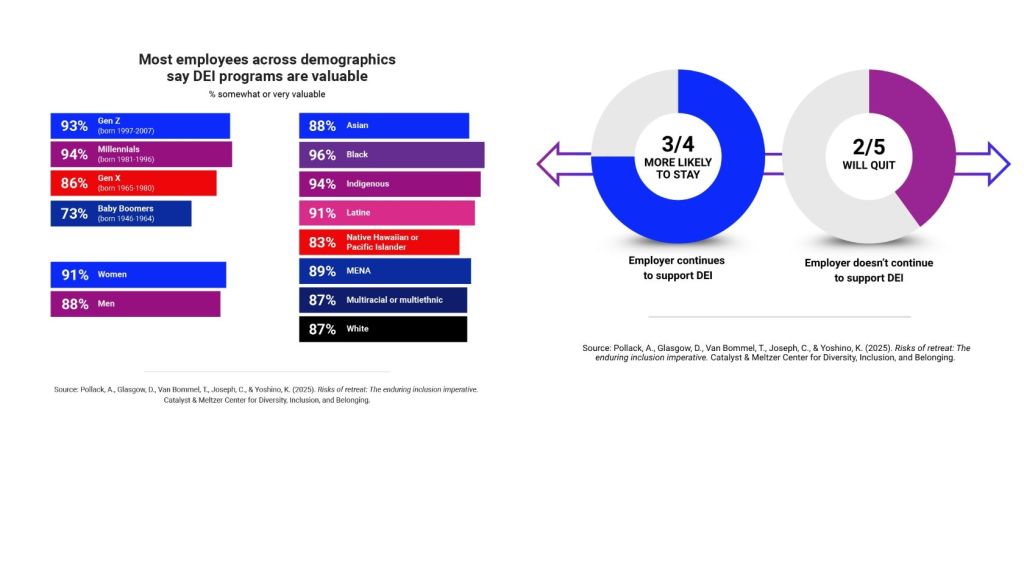
Since taking office in January, President Trump has made eliminating diversity, equity, and inclusion (DEI) in all facets of American life one of his key goals. While he’s been relatively successful in getting colleges and universities to bend the knee, it’s been a more complicated situation when it comes to American businesses. A recent survey has potentially revealed the reason for that, as many business leaders believe removing DEI initiatives opens them up to legal risk.
According to Fortune, a joint survey of 1,000 C-suite executives revealed that 83 percent believe DEI initiatives are necessary for their company’s well-being. Another 68 percent believed removing them would open them up to potential discrimination lawsuits. The survey also interviewed 2,500 employees and found that 76 percent of respondents would stay at a company that maintained its DEI initiatives, and 43 percent would leave a company if they pulled back. The survey was conducted by Catalyst, a non-profit focused on women’s inclusion in the workplace, and NYU School of Law’s Meltzer Center for Diversity, Inclusion, and Belonging.

“Opting out of DEI is not a neutral act—it’s a choice with consequences,” Christina Joseph, project director of the Advancing DEI Initiative at the Meltzer Center, told Fortune. “That’s because these programs help root out harmful policies that especially affect marginalized groups. This report reminds us that without those safeguards, organizations face more, not less, legal exposure.”
This survey only proves what we’ve already seen: the average person either supports or, at the very least, isn’t actively opposed to DEI initiatives. In fact, another recent poll shows that companies that keep their DEI initiatives are viewed more favorably by the public. The only people upset about DEI are people who can’t compete on an even playing field, or keeping it a buck, are just straight up racist.
To some degree, it makes sense why we’re seeing universities withdraw from their DEI initiatives. Many of them depend on federal funds to survive, so while they may not necessarily agree with the pullback, they don’t really have a choice. Especially considering that the Department of Education (DOE) has been explicitly weaponized to go after any university it believes is trying to provide equitable opportunities for Black, brown, and LGBTQ students.

To be clear, I’m not advocating or being an apologist for these moves; I simply understand why they’re happening.
Conversely, it doesn’t make much sense for businesses to engage in this pullback as they don’t depend on federal funds, and it’s unclear what, if any, legal action the Trump administration could take against a company for continuing DEI initiatives. Apple announced that they would continue their DEI initiatives, and all the president did was angrily post about it on Truth Social.
I’m not a legal scholar, but thankfully, Catalyst’s poll also included corporate lawyers. A vast majority, 88 percent to be precise, believed that DEI initiatives were essential to avoiding legal risk. So it seems like companies have more to lose by pulling back from DEI than continuing forward.
We’ve seen the opposing approach to DEI initiatives play out in the marketplace this year. Target has been the, uh, target of several boycotts this year as a result of withdrawing from their DEI initiatives as soon as they thought it was politically expedient. This has resulted in foot traffic being down in the stores and the company reporting a drop in first-quarter sales. Target’s woes are so pronounced that several companies have started listing consumer boycotts as a potential financial risk in investor reports.
On the other end of the equation is Costco, which has stood firm on its commitments to DEI and actually beat its sales expectations for the first quarter. Whether it comes to employees, executives, lawyers, or consumers, it appears the majority are in agreement: DEI works for everybody.
Now, if only someone could get that message through to the weirdos running the country right now.
SEE ALSO:
DEI’s Economic Impact: What The Data Reveals
Poll Shows Companies Maintaing DEI Intiatives Have Better Reputations

